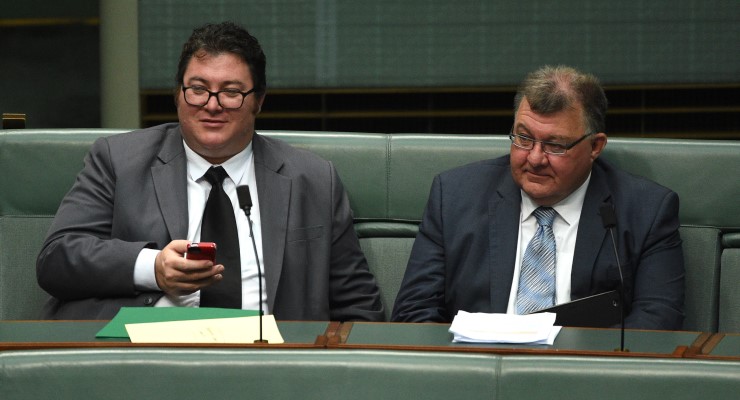
Australia is entering a decade likely to be one of the most dangerous in more than 70 years.
There is social and economic uncertainty created by the pandemic, but there are also rising geopolitical tensions in our region, cyber terrorism by hostile state actors, climate change, rising inflation with interest rate pressures, and national and international supply chain challenges. This all points to very challenging times.
There’s much to do to prepare. One immediate example is a public response plan for a new strain of COVID, part of which involves removing dangerous anti-health messages.
Threat from within
There is another dangerous threat to our society from within: a deeper social divide created by minority extremists. This is best evidenced by the far right — the group masking itself as anti-vaxxers — hijacking the vaccination debate.
In recent weeks, some of these anti-vaxxers have allegedly set fire to the doors of Old Parliament House, carried guns to demonstrations, forced small businesses to close, and abused people for wearing a mask as they walk on the street. They have created fear and uncertainty in a time of crisis.
Frontline workers and medical professionals are treating those who haven’t been vaccinated, putting themselves at risk as others wait for long-overdue medical treatment.
Small business owners and their employees often bear the brunt of much of the anti-vaxxer hostility. Shops have been vandalised and employees physically attacked. Social media has been used to abuse and threaten business owners and their customers.
Some anti-vaxxer groups have been infiltrated by far-right hate groups, including fascists. They use demonstrations as a means of recruiting members and providing a platform for white supremacists and misogynists.
In the face of all this, is it not reasonable to expect Australia’s political leaders to strongly and publicly condemn the behaviour, given the genuine threat it presents to the well-being of Australians? The storming of the US Capitol in January 2021 shows what happens if national leaders tolerate extremism.
Risk to our national interest
There is no point in talking to many anti-vaxxers — they are closed-minded and often violent and hateful. Yet incredibly some of our elected officials have openly supported their actions. Politicians who encourage these groups should be forcefully singled out, constantly and not with soft words, for they are a real risk to our national interest.
It is Craig Kelly MP who is seen as a leader of the anti-vaxxers. He is also leader of the United Australia Party (UAP). Other politicians who have given succour to the anti-vax violence include George Christensen MP, Senator Gerard Rennick, and Senator Alex Antic. These elected officials stand up in front of violent aggressive groups and give them support.
The Parliament should strongly consider motions of no confidence for these members. Indeed, if possible, they should be expelled for bringing Parliament into disrepute.
Kelly and others claim to support small businesses yet fail to call out the behaviours of anti-vaxxers, damaging the livelihoods of small-business owners who are simply following the law and the wishes of the majority of society. By supporting those who attack employers and employees, who degrade our national institutions and deface our monuments, these politicians prove they are unfit to hold political office.
Stand up and be counted
Kelly hosted at Parliament House an individual who is an outspoken supporter of Vladimir Putin who has also called for the “liquidation” of the Russian opposition leader, Alexei Navalny. Russia is poised to invade Ukraine and Putin refuses to acknowledge or apologise for the destruction of flight MH17 that caused the deaths of 38 Australians.
Prime Minister Scott Morrison and his cabinet must be seen to stand up and be counted, and to constantly, aggressively condemn those in Parliament who support our enemies. And Labor needs to do the same thing and demand that the union movement states categorically it will not support anti-vaxxers and fascists within its ranks.
The Greens should also vigorously attack those within their membership who deny vaccines.
I understand that getting UAP’s preferences is important to all parties — that’s politics. In this case, however, the pursuit of those preferences is obscene. Politicians — political parties — must show leadership, nail their true colours to the mast, and vehemently condemn violent extremists.
All businesses, but particularly small-business owners, their employees and their communities, need protection so they can continue to provide the foundation for our physical and economic health. Is a vote for the UAP a vote, perhaps vicariously, for fascism and racists?








Crikey is committed to hosting lively discussions. Help us keep the conversation useful, interesting and welcoming. We aim to publish comments quickly in the interest of promoting robust conversation, but we’re a small team and we deploy filters to protect against legal risk. Occasionally your comment may be held up while we review, but we’re working as fast as we can to keep the conversation rolling.
The Crikey comment section is members-only content. Please subscribe to leave a comment.
The Crikey comment section is members-only content. Please login to leave a comment.